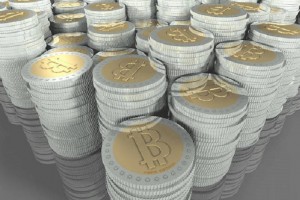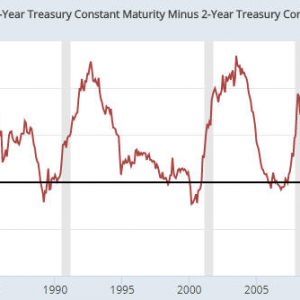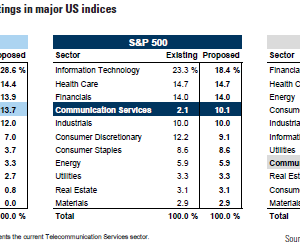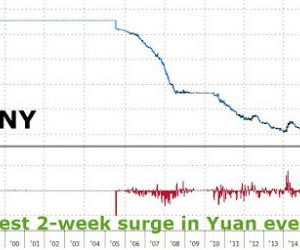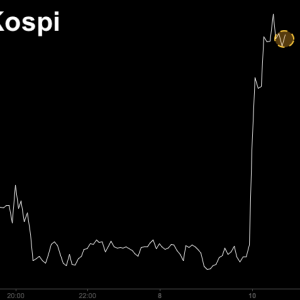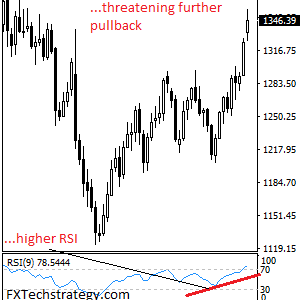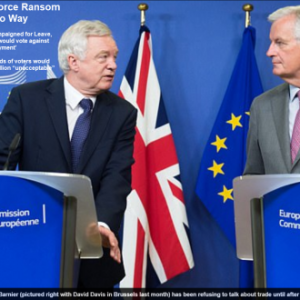Latest Posts
-
Finance 0
Revisiting The US Yield Curve
In a blog post in February of last year I explained that an inversion of the US yield curve has never been a recession signal. Instead, the genuine recession signal has always been the reversal in the curve from ‘flattening’ (short-term interest rates rising relative to long-term interest rates) to ‘steepening’ (short-term interest rates falling relative to long-term interest rates) after an extreme is reached. It just so happens that under normal monetary conditions an extreme usually isn’t reached and the reversal therefore doesn’t occur until after the yield curve becomes inverted. The fact is that it doesn’t matter how ‘...On September 11, 2017 / By Kurt Osterberg -
Finance 0
S&P 500 Snapshot: Up 9.94% YTD
The S&P opened Friday at its intraday low, hit its high within a couple of hours, and remained mostly flat for the remainder of the day. The index closed the day with a 0.15% loss from Thursday and is up 9.94% YTD. The U.S. Treasury puts the closing yield on the 10-year note at 2.06%. Here is a daily chart of the S&P 500. Today’s selling puts the volume 6% above its 50-day moving average. Here’s a monthly snapshot of the index going back to December 2007. A Perspective on Drawdowns Here’s a snapshot of record highs and selloffs since the 2009 trough. Here is a more conventional log-scale chart with drawdowns hi...On September 11, 2017 / By Kurt Osterberg -
Finance 0
Sensex Opens Firm Tracking Positive Asian Stock Markets
Asian stock indices are higher today as Japanese and Hong Kong shares show gains. The Nikkei 225 is up 1.38%, while the Hang Seng is up 0.92%. The Shanghai Composite is trading up by 0.23%. The US equity benchmarks ended the last trading session of the week lower amid concerns about the economic impact of Hurricane Irma. Back home, share markets in India have opened the day on a positive note tracking positive signals from Asian markets. The BSE Sensex is trading higher by 172 points while the NSE Nifty is trading higher by 47 points. The BSE Mid Cap and BSE Small Cap index opened the day up by 0.5% & 0.4% respectively. All...On September 11, 2017 / By Kurt Osterberg -
Finance 0
You Have Been Warned: The Situation In The Markets Is Much Worse Than You Realize
It’s about time that I share with you all a little secret. The situation in the markets is much worse than you realize. While that may sound like someone who has been crying “wolf” for the past several years, in all honesty, the public has no idea just how dire our present situation has become. The amount of debt, leverage, deceit, corruption, and fraud in the economic markets, financial system, and in the energy industry are off the charts. Unfortunately, the present condition is even much worse when we consider “INSIDER INFORMATION.” What do I mean by insider information… I will explain that in a minute. However, I receive a lot...On September 11, 2017 / By Kurt Osterberg -
Finance 0
S&P And MSCI May Change The Composition Of The Telecommunications Sector
In July of this year S&P Dow Jones Indices and MSCI announced they were considering making changes to the current GICS Telecommunications Sector. Any changes would be announced in November and go into effect in 2018. Currently, the telecommunications sector represents about 2% of the S&P 500 Index. S&P’s and MSCI’s intent is to broaden the composition of the sector and rename it Communications Services with the sector weight increasing to approximately 10% of the S&P 500 Index. As noted in the release, “The main proposal set out in the consultation paper is the creation of a Communication Services Sector,...On September 11, 2017 / By Kurt Osterberg -
Finance 0
Is The Yuan About To Tumble After Friday’s Shocking PBOC News? Here Is Goldman’s Take
In a move that stunned China currency watchers, late on Friday (local time) Bloomberg reported that China’s central bank decided that it would remove a reserve requirement for financial institutions trading in FX forwards for clients by cutting it to zero from 20% currently. The change would take place on Monday, September 11 (it has yet to be confirmed). As a reminder, banks, funds and other financial institutions trading FX forwards for clients were required from October 2015 to set aside 20% of the past months’ sales as reserves in a move that was aimed at curbing currency speculation. Subsequently, the PBOC further punished trade...On September 10, 2017 / By Kurt Osterberg -
Finance 0
Asian Shares Rally – Gold Falls As Markets Breathe Heavy Sigh Of Relief
The “no apocalypse” relief trade is in full effect now. Having manifested itself early in a dollar rebound and yen weakness, things are getting underway in earnest and the risk-on move is gathering some steam (although as sure as I write this it will turn on a dime). Here’s the Kospi: And the Nikkei: Meanwhile, Treasury yields are rebounding… “U.S. Treasuries may extend their decline as the North Korean tensions look set to abate further while the U.S. economy remains resilient,” Hideki Shibata, senior rates and currencies strategist at Tokai Tokyo Research Center says on Monday. “The lack of missile action from North Korea on...On September 10, 2017 / By Kurt Osterberg -
Finance 0
Economic Forecast 2018-2019: Consumer Spending Grows Slowly
Shutterstock Consumer spending is an important part of the economic forecast, though not the whole story. To predict future spending, I look at consumer incomes, pent-up demand, interest rates and credit availability, and attitudes. But attitudes are mostly derivative from the fundamentals. When incomes are up and unemployment is low and interest rates are low and gasoline is cheap, then it’s pretty certain that consumer confidence is strong. I always look at the two major surveys of consumer attitudes, but I don’t expect to be surprised. The times when the surveys really show their worth is after major non-economic events, such as war. R...On September 10, 2017 / By Kurt Osterberg -
Finance 0
Gold Faces Pullback Threats Despite Bull Pressure
Gold: The commodity looks to weaken further following its Friday price rejection. On the downside, support comes in at the 1,340.00 level where a break will turn attention to the 1,330.00 level. Further down, a cut through here will open the door for a move lower towards the 1,320.00 level. Below here if seen could trigger further downside pressure targeting the 1,310.00 level. Conversely, resistance resides at the 1,350.00 level where a break will aim at the 1,360.00 level. A turn above there will expose the 1,370.00 level. Further out, resistance stands at the 1,380.00 level. All in all, Gold looks to weaken further....On September 10, 2017 / By Kurt Osterberg -
Finance 0
EU Accuses UK Of Backtracking: UK MPs Threaten To Block Divorce Payments
Brexit negotiations hit the rocks with the size of the Brexit divorce bill the key issue. The Independent reports: Britain is ‘backtracking’ on its Brexit divorce bill commitments, moans Michel Barnier, the EU’s chief negotiator warns. My response: Hooray for the UK! Michel Barnier said he was “disappointed” by the UK position and publicly warned the British team it should go back to the drawing board after it presented a legal analysis arguing that Britain owed far less than the Commission believed. “So there’s a moral dilemma here: you can’t have 27 paying for what was decided by 28, so what was decided by 28 member sta...On September 10, 2017 / By Kurt Osterberg
Top Posts
-
 The Importance for Individuals to Use Sustainable Chemicals
The Importance for Individuals to Use Sustainable Chemicals
-
 Small Businesses: Finding the Right Candidate for the Job
Small Businesses: Finding the Right Candidate for the Job
-
 How to Write the Perfect Thank You Letter After Your Job Interview
How to Write the Perfect Thank You Letter After Your Job Interview
-
 3 Best Large-Cap Blend Mutual Funds For Enticing Returns
3 Best Large-Cap Blend Mutual Funds For Enticing Returns
-
 China suspected in massive breach of federal personnel data
China suspected in massive breach of federal personnel data



